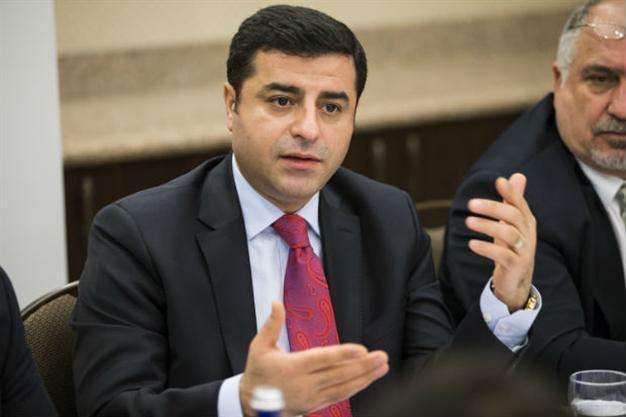HDP co-chair blasts EU, US for relations with Turkish gov’t
Rifat Başaran - ANKARA

AA photo
The co-chair of the Peoples’ Democratic Party (HDP) has chastised both the European Union and the U.S. administration for their approach to the ruling Justice and Development Party’s (AKP) style of governance, accusing the EU of covering up the Turkish government’s crimes and U.S. President Barack Obama of recognizing President Recep Tayyip Erdoğan’s de facto change of the country’s regime.“The EU has marketed its own principles. The EU is now in a position to be questioned about human rights and the Copenhagen Criteria,” HDP co-chair Selahattin Demirtaş told a group of journalists on Dec. 8, referring to developing relations between the EU and Ankara after the EU agreed at a summit on Nov. 29 to a three-billion-euro ($3.2 billion) aid deal to stem the flow of migrants from Turkey, which is hosting over two million Syrian refugees.
In the first days of December, it was revealed in a statement signed by EU Commission President Jean-Claude Juncker that the EU had provided a commitment to Ankara to launch necessary procedures on five accession chapters currently under veto by Greek Cyprus.
Demirtaş’s remarks came when he was asked whether recent progress in Turkey-EU relations would serve as leverage for addressing the deterioration of human rights and freedoms in Turkey.
“Just to have the refugee problem resolved, the EU has covered up all crimes of the AKP government by turning a blind eye to all violations of human rights. It has made human rights an issue for bargaining in international relations,” he said. “Even if the negotiations are opened, no move such as pressing the AKP should be expected from the EU. The EU is powerless; it can’t even find a remedy for its own problem,” he added.
Demirtaş was in Washington last week to participate in a Middle East Institute (MEI) conference as a keynote speaker. He also held meetings with officials from the U.S. State Department, yet made no bones about his reservations on Obama’s Nov. 9 call to Erdoğan to “congratulate the Turkish people on the Nov. 1 elections.”
“It is a situation which stems from Erdoğan’s dominant and magisterial personality in Turkish politics. What would he tell [Prime Minister Ahmet] Davutoğlu if Obama had called Davutoğlu? Davutoğlu didn’t win the election anyway. The one who won and lost the election is Erdoğan. This way, he [Obama] has accepted Erdoğan’s dominant position and his position of de facto changing the regime. Normally, he should have called the prime minister,” Demirtaş said.
















